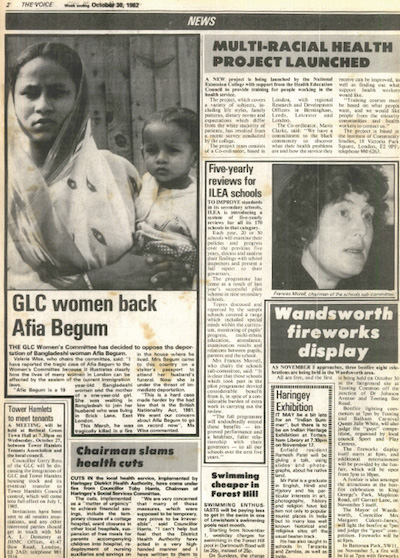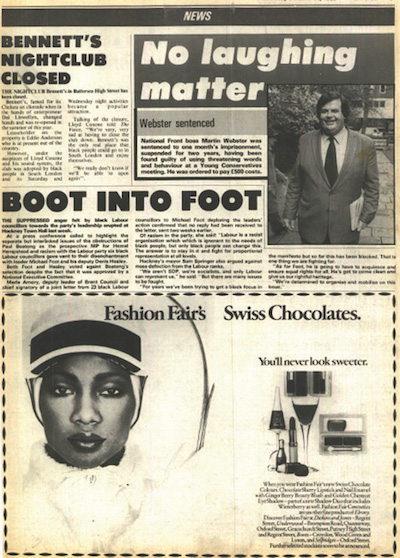Voice35Years: A sign of the times

VOICE OF OUR COMMUNITIES: The front page splashed on the deportation of a Bangladeshi woman who was living in Britain on murder of Aseema Devani
AFTER ITS launch in August 1982, The Voice quickly established itself as a newspaper which set out to cover stories from all sections of the black and minority communities, giving it the unofficial title as the voice of the people.
This was reflected in its front page lead story in its ninth edition on October 30, 1982, when it reported on the murder of a young Indian woman on the Chalk Hill estate in Wembley in what police had described a callous attack for the sake of a few pounds.
The Voice headline read ‘brutal murder’ and reported that 25-year-old account clerk Aseema Devani was stabbed in an apparent robbery as she walked home on a quiet street from Wembley Park station after having dinner with a friend.
The story also reported that she was stabbed once through the heart and her empty hand bag was next to her, indicat- ing that the motive could have been robbery. While the paper had labelled itself as a black newspaper, it was now being read by a much wider community as it did not limit its coverage of news.
The front page also promoted a special expose on the Caribbean Times newspaper, which The Voice said was driving a wedge between black and white, and a special centre spread feature on the housing crisis which was affecting black people in Britain.
On page two, the lead story was ‘GLC women back Afia Begum’, which revealed that the Greater London Council Women’s Committee had opposed the planned deportation of the Bangladeshi woman who was set to join her husband in the UK before he was tragically killed in a house fire.

Page two focused on the potential a visitors’ passport
Afia Begum, who came on a visitors’ passport, was under the immediate threat of deportation, and Valerie Wise, who chaired the GLC committee, said: “Afia’s case clearly illustrates how the lives of women in London can be affected by the sexism of the current immigration laws.”
Over on page three, the main story headlined ‘Boot into Foot’ was a follow-up story from an earlier edition about the anger which was being felt by the black community over the obstruction of Paul Boateng selection as a prospective Labour candidate in Hemel Hampstead.
The Voice story said this anger had boiled over at a press conference to highlight the issues at the Hackney Town Hall. Merle Amory, deputy leader of Brent Council, who had led the protest against the Labour party leadership which had opposed Boateng’s selection, said: “Labour is a racist organisation which is ignorant to the needs of black people, but only black people can change this. The answer is to stay in it and fight or proportional representation at all levels.”
On page seven, The Voice carried a full page report conducted by the Centre for Contemporary Studies which condemned the reportage of the Caribbean Times newspaper. In comparing the paper with another title, the West Indian World, the report describes the Caribbean Times as more aggressive in its reporting and makes no distinction between news and comment.

Page three followed Paul Boateng’s struggles
The piece read: “The Caribbean Times tends to show the black community in Britain as victims of white authority. The general impression of the two papers is that whereas the West Indian World is concerned to give a balanced picture of what is good and bad for the black community in British life, the CT concentrates on the negative side and thus drives a wedge between the black and white communities.”
The centre page feature story written by Sharon Ali on pages 14 and 15, focused on the housing crisis which was gripping black Britons in which they have to wait longer to get allocated housing and in most cases they are dumped on run down estates.
The article goes on to say local authorities have been accused of ‘racist allocation policies’ whereby black people have been dumped on run down estates where refuse is not cleaned up regularly as it is on predominantly white estates.
“Broken windows and lifts are not repaired; thus there is no incentive for the people living on the estate to take pride in where they live. While the whole issue of housing is problematic, in recent years groups of black people have been taking the initiative and forming themselves into housing associations and co-operatives to try and alleviate the appalling housing situation.”
It then went on to list three local run housing associations which were leading the way: LACAYE Housing Co-Operative in Tower Hamlets; UJIMA Housing Association in Harrow and UMOJA Housing Co-Operative in Stratford, east London.
Over in The Buzz entertainment section, The Voice featured album and singles reviews for a number of US and Jamaican artists, including Diana Ross, Willie Hutch, The Dazz band, Gregory Isaacs, Barry Ford and Sugar Minot.
The Voice is celebrating its 35th birthday this year. Share your Voice memories, comments and birthday wishes on social media, using the following hash tag: #Voice35Years
Read every story in our hardcopy newspaper for free by downloading the app.






